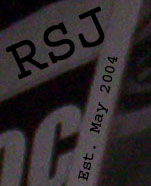|
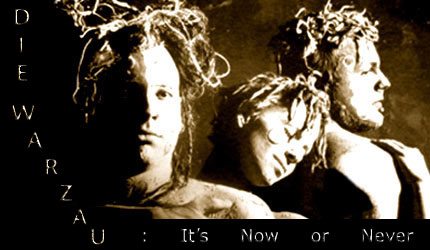
Politics don't usually make it to the dance floor. Though political rebellion through music is certainly nothing new, it's
also not something guaranteed to get the party started. Unless, of course, you can seamlessly combine social commentary with
one hell of a dance groove. If this is the case, you might just be able to get away with it. You also might just be a member
of Die Warzau.
Formed in 1988, Die Warzau began as a partnership between Chicago performance artists Jim Marcus and Van Christie. Though
their music crossed numerous genres, the duo was embraced by the industrial community and released three full-length albums.
However, frustrated with the music industry -- their former label in particular -- the team disbanded in 1995. Though both
remained active in various musical projects, it appeared that the band responsible for club hit "All Good Girls"
was never to produce a follow-up.
Fast-forward to 2005 and, my, how things have changed. Die Warzau has reformed to release Convenience, their first work
in ten years. With a new record, a new label and a new regime to fight against, Christie and Marcus have found a reinvigorated
sense of purpose in their band. Die Warzau is back. Let the nation (and the nation's dance floors) take note.
Rock Star Journalism: The two of you began as individual performance artists. Why did you first decide to work together?
Van Christie: We had a lot of the same interests in music. I was in a band with some people that were a lot older than
me, and I thought it would be a lot cooler to work with someone my own age that was also into performance art.
Jim Marcus: I think we clicked pretty quickly music-wise, cause all we knew was what we didn't want to do. Everything
else was pretty wide open. It seemed like a lot of other people that you might want to work with were really tied down to
one thing, or they had a lot of opinions about music but weren't going to do it. The first time we got together we just went
and did a bunch of stuff, and it just made sense.
RSJ: Your lyrics tend to be more political than other bands you might hear in the club -- do you find it's now more important
than ever to speak out?
JM: Considering the political climate right now, it's probably more important. I mean, they're passing legislation to
make it a crime not to report some guy passing a joint at a party. I'm not quite sure what's going on with this country.
I don't think anyone's ever going to say again, after the first Bush election, "Hey, it doesn't matter if I vote. How
bad could someone fuck the country up in four years?"
RSJ: It seems political involvement is becoming more of an issue for younger generations than in previous years.
VC: Yeah, hopefully it'll become a little more important and a little less of something that's seen as uncool, which it
kinda seemed like it turned into toward the end of the 90s.
JM: I'd like to see the pendulum swing back, for people to be actively interested again.
RSJ: Both of you have children. Does that increase your concern about the current US political situation?
VC: Oh definitely. It makes you want to move to Portugal or something.
JM: When you don't have kids, it's easy enough to step away when you see the signs of the apocalypse. But when you've
got people that you need to take care of and you're really concerned about their future, it makes a huge difference. I mean,
the set of laws that we've passed right now, I'm not sure what that means to my kids, but it makes it impossible not to fight
against it.
RSJ: How important is it to you that people understand the message in your songs? Do you think that component sometimes
gets lost in dance music?
VC: It probably gets lost a little bit, but most of the people that we come in contact with are pretty concerned in the
same way we are. So, I'm not sure it gets lost so much as music isn't the first place people look for their political knowledge.
JM: I don't think anyone who's ever gone to one of our shows or read [the lyrics] is gonna miss any of it, but if they
do, I don't have a problem with people liking things on the surface. I know a lot of people aren't that political. Though,
I don't think we can afford not to be political anymore.
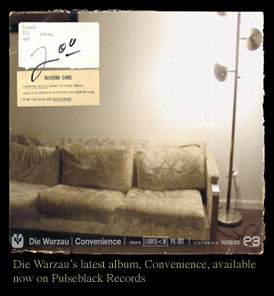 RSJ: One of the things that has always stood out about your band, musically, is the mixing of various genres. Are there any
types of music you haven't worked with yet that you'd like to?
VC: I heard some pretty cool Serbian music yesterday.
JM: We had a plan to release a record with a lot of African undertones. That would be kinda fun. I don't think we would
ever say something's out of the question. I think if you looked at both of our music collections you'd see a massively diverse
group of music.
RSJ: Do you each bring a different element to the music you create together?
JM: I have noticed that in about a third of the cases something happens that's almost like a pattern. I like to write
songs, and on their own they can get really expected but catchy. And I think Van is able to turn that around and add everything
unexpected. I can think of a lot of songs that, without Van, would have been really predictable, slightly catchy songs.
VC: It would be good if there was more of a formula, but a lot of times it seems like every song is its own album.
JM: Convenience is kinda cool too, cause if you listen from one song to the next, the base for each came from a different
one of us and progresses a different way.
RSJ: Do you think some of your musical eclecticism comes from being rooted in Chicago, considering so many types of music
have ties there?
VC: Definitely. And people's acceptance of [different types of music] here. It's not as big time as the east coast or
the west coast or London, where shit's getting so segmented.
JM: Chicago's such a great musical place. It's weird all the different influences here; it's all over the map.
RSJ: You've said that the songs you have recorded for the next album are already going in a different direction. How
so?
VC: I wouldn't say it's a different direction from us entirely, but maybe just a bit more structured. If anything, they're
a little more finished as we start to record them, and they're not total experiments from the beginning.
JM: It sure went a lot faster. A couple times we went in and a song came out almost immediately. A good example was
"Insect."
RSJ: That's the one you had as a free download on your site?
JM: Yeah. "Insect" was supposed to be a song for the next album, and it just happened so fast we figured we'd
get some use out of it by getting people to spread some information.
RSJ: You seem very open to the use of the internet to download music. Do you see that situation as completely positive,
or do you have any reservations about it?
VC: Just the low cost. That's not exactly helping the undiscovered artist. But it's obviously the best model for now.
JM: What's weird is the same arguments that people had over and over again about cassette tapes are being had now. A
halfway decent knowledge of history suggests that this is gonna work itself out. Every time you try and keep consumers from
using music the way they want to, you lose. Record companies like to think that they own music, and they really don't. Record
companies are a temporary distribution system. The same way drums were a temporary distribution system for rhythm. I just
feel like as long as they understand that they're temporary, and they have to accommodate the needs of the user, that's great.
But I think over the past few years, record companies have gotten this insane hubris where they believe that they're actually
building something as opposed to marketing something. And so you'll see things like "American Idol" where the winner
gets a recording contract. That's absurd. It's almost like the music industry getting up and saying, "We can take anybody
and sell a million copies. Why? Because you guys are idiots."
RSJ: There's not a lot of credit given to the listener.
JM: There's not a lot of credit given to the artist either. Look at Aerosmith's entire career. There are A&R people
that think they are solely responsible for that.
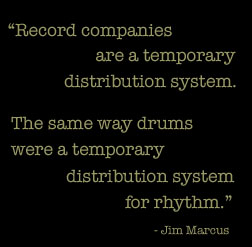 RSJ: You've said that you decided to reform the band partially because you felt like you could now work with less label interference.
While that's certainly an upside to having a smaller label, do you feel that it has made it harder to actually get your work
out to the public?
VC: It's different challenges. I mean, a lot of the same people that the record company would be hiring you can hire
on your own. Not a lot of the promotion went through the record labels we were on.
JM: I think what it comes down to is that there's so much baggage that goes along with it. Even if there are drawbacks,
even if there are difficulties, they're worth it. I remember, we were about to release Big Electric Metal Bass Face and the
label decided they were gonna do a bunch of little plastic faces to send out with it. Completely unbiodegradable --
VC: And nothing to do with the album.
RSJ: You had a lot of promotions you didn't like with TVT, right?
VC: Yeah. There was the one with the suicide letter that was in Rolling Stone; that wasn't too cool.
JM: It made us realize that they had no more respect for fans than they did for us. [Fans] aren't dumb people at all.
Because they're passionate about music, I think a lot of labels think that's a good excuse to consider them na´ve. It just
doesn't sit well.
RSJ: Of newer artists, who do you think is currently doing something interesting that either is or isn't getting exposure?
JM: It's nice to see Chemical Brothers getting a decent amount of exposure for their new record, which is really good.
VC: I really like The Killers record.
JM: That record is really solid from beginning to end. That's such an unexpected thing.
RSJ: There have been a few albums recently from the classic bands of industrial -- Skinny Puppy, Ministry, as well as
some others all had new albums last year. What do you think of these bands' newer work?
VC: I liked the Skinny Puppy record. I didn't really hear that much of the Ministry record.
JM: I think it's good. It's a good Ministry record -- it doesn't sound like anybody else but Ministry. And the fear
was that they were gonna wander into other people's territories. I've noticed that a lot of ambient music has taken a lot
of chances I wasn't expecting. I kinda thought that trance music was killing itself, but now I feel like there's a lot of
hope for it.
RSJ: So, you've seen a resurgence in the electronica genres?
JM: Yeah. It was like it was following a path that we were pretty aware of what was gonna happen. And I think a lot of
glitch music has rescued that and some of the more recent IDM stuff has said, okay, we're not gonna follow the same path.
RSJ: Especially while Die Warzau was on hold, you've both done a lot of production work for other artists. What's been
your favorite project of someone else's to work on?
JM: I did the Wish I'd Taken Pictures record for Pansy Division. It was a really funny record, and it was completely
sideways from anything I'd done before. Those guys are really great musicians, and it was just really fun. We recorded in
Anne Rice's old house, and it was a really neat experience.
VC: I did the Whatever album with Green Velvet. That was pretty great; I did a bunch of his remixes also. I did a couple
records with George Clinton -- that's definitely cool.
RSJ: Didn't you do an EP with him as well?
VC: Yeah. It's almost done.
RSJ: How did you get involved with him?
VC: I just did a few sessions with him in the 90s at this studio and kept in touch with him. Some of the guys in his
band live in Chicago. And then I did a couple records with him for Trax, where I was working last year. We just got him
to come by, and we collaborated on some pretty political stuff.
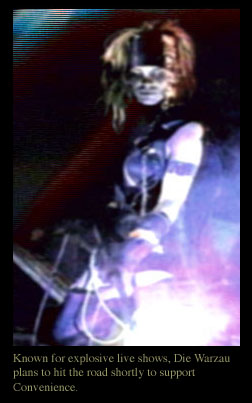 RSJ: You've also done some things outside the music world. Jim, you've mentioned working with theatre and writing a screenplay.
Was this ever filmed?
JM: I was part of the Organic Theatre Collective, and we did about 10 of my plays. I was working with a bunch of non-profit
advertising campaigns -- I was one of the lead creatives on "The Truth," which is a big anti-tobacco campaign --
and I kinda got the urge to do a longer piece. I really wanted to work with some actors and put something together. So,
I finished a screenplay, and I'm fishing around to see what I can do with it.
RSJ: Are there any tour dates planned yet to support Convenience?
JM: We did a couple shows to try out some songs we hadn't played before, and we're talking about taking it back out in
a couple months.
RSJ: I'm sure you have quite a few, but if you had to choose, what was your most memorable live experience?
JM: We did this tour with Foetus where we opened half the time and he opened half the time. His musicians were amazing,
but they were playing a lot of live stuff, and they couldn't play some of the old techno stuff. So, we went through and put
together arrangements of a lot of those songs. I remember, specifically, playing in the Metropol -- Foetus came out and
played a set, and then we came out and played. Then we both went offstage and came back on and played a half hour set of
old Foetus songs together. That was one of the most fun things I've ever done.
RSJ: I know you had a live sax player on a previous tour, which is not something you'd typically find in an industrial
show. How much live instrumentation are you planning for this tour?
VC: As much as possible.
JM: The last couple shows we did were almost completely live, and they were a lot of fun.
VC: We're trying to build up the saxophone on the new George Clinton record we're working on. Cause we don't have [live
sax player] Mars around right now, so we got some other people, and we actually had a girl playing clarinet today.
JM: We get to work with a lot more diverse groups of people right now.
VC: Yeah, our studio is constantly having people come in and out.
JM: And we're trying to build our label [Pulseblack] in a way that makes sense. Like, a lot of smaller labels put out
records constantly because they have to in order to survive. And a lot of larger labels put out records constantly because
they can. But a lot of records don't need to come out. I feel like if we can do this the right way, then maybe every record
we put out can stand on its own as a great record. That would be something that would make me really happy -- even if we
make no money at all.
Got something to say about this feature? E-mail us.


|
